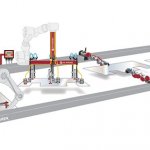Why Hydraulic Machines Benefit from an Oil Cooler
Hydraulic machines are heat-generators. Every component generates heat as it moves hydraulic fluid from one point to another. Focusing on energy consumption as opposed to particle contamination, helps with efficiency levels. All additions such as depth filters, add to the heat load. In open circuits, it could be orifices, throttles, and hydrostats. Internal motor and pump leaks cause pressures to drop increasing heat production.
Energy waste due to dropping pressures are part of hydraulic machine operation. While they can’t be eliminated, they can be minimized by installing hydraulic oil coolers.
The Importance of Hydraulic Oil
Adequate lubricated components reduce the machine’s likelihood of friction. High levels of friction increase wear and diminish the integrity of the device. Achieving optimal performance levels requires appropriate oil viscosity. As a machine heats up, the viscosity levels drop. The cooler the machine, the thicker the oil becomes. It should hover somewhere around a thickness of 20 centiStokes (cSt).
How this oil temperature is reached is greatly influenced by the oil’s grade and viscosity index (VI). A wide range of oils is available to assist different machines as they must perform optimally in various weather conditions. Achieving the critical temperature of the fluid depends on the oil being used and the operating temperatures.
Using Hydraulic Oil Coolers
Hydraulic oil coolers help with balance. Using these devices helps with energy losses from external sources like furnaces or engines, but they can even help mitigate the impact of environmental surroundings. Hydraulic oil coolers are utilized in agriculture, mobile, and industrial settings. Some designers factor in the benefits as a prerequisite to ensure cost-efficiency. Oil coolers help:
- Maintain the correct temperatures
- Extend the lifespan of the machine’s components
- Improves efficiency
- Reduces the cost of maintenance and repairs
Reaping the advantages of hydraulic coolers requires appropriate sizing. Devices that are too small allows the oil to get too hot. Coolers too big contribute to overheating.
The Right Hydraulic Oil Cooler for Hydraulic Machines
Air-cooled Systems
Air-cooled systems rely on heat to diffuse hot air. Found inside the heat exchanger’s coil, the cooler forces cold air over the fluid to regulate temperatures. Operating costs are relatively low as it requires hot air to keep systems cold. Machine operators find air-cooled systems attractive because they don’t contaminate water causing complications.
Water-Cooled Systems
Water-cooled systems employ cold fluids to regulate temperatures. The liquids are separated by a barrier to reduce contamination. They operate much quieter, are compact, and have no bearing on the surrounding ambiance. To the same degree, outside and surrounding temperatures have little to no influence on its cooling capacity.
Application Data for Selecting a Hydraulic Oil Cooler
The first step is deciding the appropriate cooler type. The second is the application. Assembling information necessary for choosing a hydraulic oil cooler includes:
- maximum system temperature
- type of fluid that needs cooling
- fluid-flow rate
- maximum pressure drop
- heat load
Heat Load
The most critical aspect is determining heat load. One way owners determine the operating efficiency is through an assumed percentage. A machine operating at an 80% capability appropriates 20% input power that is heat loaded. Using a calculation is more accurate. Analytically, the pressure losses and flow rates could be measured to determine heat load.
Safety Factor
After calculating the size of the oil cooler, engineers employ a “safety factor.” The safety factor values for contingencies. How much to consider depends on the confidence in the heat load calculations. Many engineers start their calculations estimating ambient air temperatures of around 100°F and water around 80°F even when the likelihood of reaching those numbers is rare.
Cooler Plumbing
The cooler’s plumbing needs to be a return line or an off-line circulation. Using a return line is straight forward and should be determined by the max system (oil entering) or reservoir (oil exiting) temperatures. Off-line temperatures are a little more complicated. The inlet in relation to the return-line needs consideration. The best option is to work with an experienced team of individuals who can assess the installation of hydraulic oil coolers to maximize machine operations.
Additional Considerations
Other application factors for sizing your cooler include:
- ambient air temperature
- fan motor
- hydraulic motor
- air-cooled hardware










